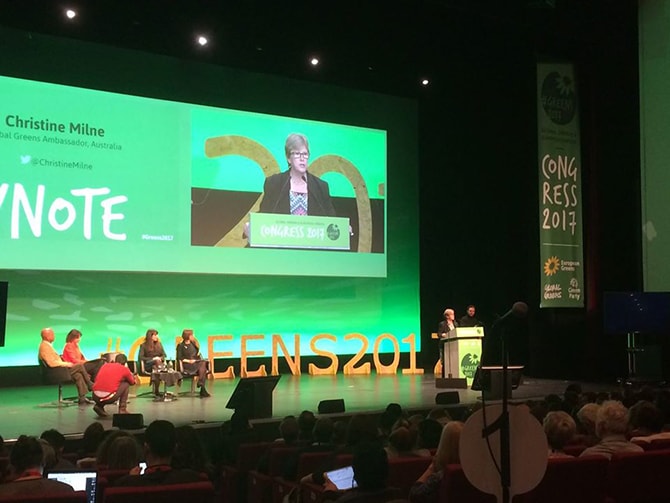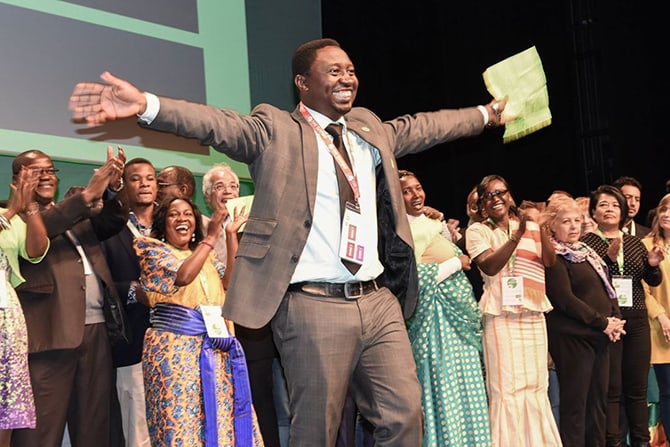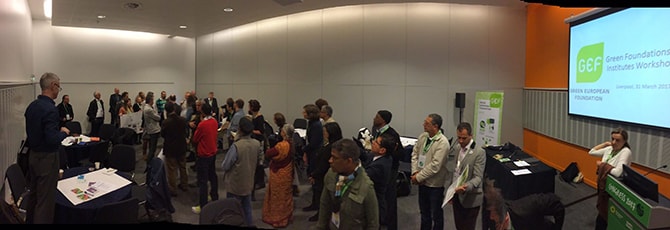Thoughts On Returning Home From Global Greens 2017 / Wot i did on my holidayz
The 2017 Global Greens Congress in Liverpool was inspiring and energising from start to finish, with discussions of big ideas, opportunities to link up with people from all over the world, and sharing of skills and experiences in every direction.
What I brought home from the Congress, above all, was a feeling of how extraordinarily privileged we are in Australia, in more ways than we ever realise, and that we have a heavy responsibility to use that privilege, genuinely and humbly, to build a better world for all those we share this precious planet with.
The opening plenary featured powerful speeches from four remarkable women – our own Christine Milne, pictured below, and Margaret Blakers, as well as UK MP Caroline Lucas and Swedish Deputy Prime Minister Isabella Lövin (she of poking fun at Donald Trump with a line up of female ministers fame) – firing everyone up with calls to fight capitalism, fascism, environmental destruction and apathy by building positive, connected, thoughtful politics. The radical vision of a different way of doing politics that shone through each of these speeches, simultaneously translated into several languages, had the 2000 delegates on our feet repeatedly. And the parade that followed of representatives from 103 Green parties from all over the world created a bond that lasted the rest of the Congress, and well beyond.

In the closing plenary, we were addressed by Dr Frank Habineza, pictured below, the Presidential candidate for the Democratic Green Party of Rwanda, who is facing beatings, arrest, or even assassination (like his Deputy a few years ago) but is standing anyway because of his passion and commitment. The previous speaker, Mar Garcia, Secretary General of the European Green Party, marked the absence of so many who couldn’t make it to Congress because they had been detained, denied visas, or killed because of their beliefs and actions, Mar paid tribute, in particular, to the late Chico Mendes, Berta Caceres, and young Swedish Green, Zaida Catalan, murdered in the Congo just last week.

In between, I met with Greens facing criminalisation and abuse in Russia, Greens working successfully to win trust and support in deeply underprivileged areas of the UK, Greens building on the ruins of both communism and capitalism in Bulgaria, Greens leading the opposition in Iceland’s parliament but with only two staff for their 10 MPs, and Greens sowing seeds in poor agricultural areas of India and Nepal.
It threw into stark relief the question of what really matters. It enabled us to put aside differences in personality and approach and really dig deep into issues, learning from each other’s experiences and perspectives.
The main reason I travelled across the planet to be at the Congress was for a half day gathering of representatives from Green think tanks from all over the world.

Almost 50 people from 22 different organisations from every continent (except Antarctica – when will those penguins start to pull their weight?) came together to share our experiences, ideas and expertise. What was striking was that, despite differences in culture and language, in legal and political structures, and in financial position, we shared a tremendous amount. From the enormous, global Heinrich Böll Foundation to the tiny, fledgling institutes in Nepal and Togo, from those in solid democracies like ours to those struggling against political oppression in Russia and Poland, we are all working towards the same goals, heading in the same direction. Climate change and community were at the heart of what everyone wanted to talk about, in various different ways. The challenge we set ourselves was to support each other to work towards those goals.
While our Green Institute is small, our struggles pale before those of many of the others who were in the room. It was a privilege to be able to advise some of our colleagues on how the Institute was established, how we maintain both connection to the party and independence from it, and our models for outreach, as well as to learn from how even smaller organisations in developing nations use what resources they have to build movement around radical ideas. At the same time, it will be wonderful to benefit from new relationships with the very large European foundations, some of which are doing similar research to ours, and from whom we can gather more ideas and support.
I was also excited to be able to host a skill-share session, bringing Tom Crompton, founder of Common Cause, to the Congress to take delegates through how to use values to drive social change. Many of you will know of my passion for the Common Cause framework – a powerful model for understanding how our minds work and interact. Tom was able to present its basics and answer questions, as well as join us in a discussion about how the framework can help Greens with communicating and campaigning. We now have a network of Greens, mostly from Europe and Australia, interested in following this up. A vital question we are grappling with is how to make this accessible and relevant to our colleagues in Africa, Asia and South America. The research is clear in its conclusions that values match across countries and cultures. Our challenge is to listen to what our colleagues in the global south need, and see if the Common Cause framework can be adapted to a form more useful for them.
On the question of recognising what really matters, I was delighted to help ACT Greens member and former Swedish Greens MP, Gösta Lyngå, and Swedish Green and academic, Tove Engvall, host a session on alternatives to GDP. The session had people hanging from the rafters, with representatives from 18 countries including South Korea, Estonia, Mongolia, Japan, the USA, Greece and Austria. You can read my summary here of the wide-ranging discussion about radically rethinking the economy as a whole, embedding social and environmental wellbeing into it, embracing complexity, and challenging existing power relations through ideas like Universal Basic Income.
Universal Basic Income was an idea which kept coming up across the Congress, and I was excited to chair a session on it featuring Jooeun Cho from the Institute for Green Transformation in Korea, Barb Jacobson, the coordinator of Basic Income UK, and Swedish Green MP, Janine Alm Ericson (yes, the Swedish Greens were everywhere, doing an amazing job!) Over 100 people from all over the world crammed into the room to take part in this conversation: people with experience in trials in Finland, Canada and the Netherlands; people organising around a Tobin Tax to fund a global basic income; people deeply sceptical of the idea and challenging us to justify it; and people who see the right co-opting it as a tool to destroy the welfare state and wanting to understand it better so as to seize it back. From highly automated South Korea and Taiwan to class and gender politics in Brexiting England to antifascist organising in France, UBI strikes a chord and presents as an important part of building a fairer, more connected society.
Both the UBI and GDP sessions involved stimulating discussions about what wellbeing means, which showed a remarkable commonality across countries and cultures. Quality of life, moving beyond necessities to social connection, trust and empowerment, having the time to live life to the fullest, and closeness to nature all kept being brought up. Importantly, it was also raised that social inequality and environmental destruction both inherently undermine wellbeing, and that focussing on wellbeing across society is part of the path to building a more equal, less environmentally destructive world.
These ideas were central to a panel I sat on with the New Economics Foundation’s Christine Berry and Green Party of England and Wales’ Olivia Hanks, on communicating post growth economics. We discussed how, compared to the right’s approach to communicating economics, we on the left have generally “brought a spread sheet to a knife fight”, trying to convince people with data when values, emotion and experience are far more powerful. The approach of “learning by doing”, rolling up our sleeves, getting our hands dirty, and building the new socio-economic structures we want and need was something many in the room found exciting. In the week leading up to the Congress, I met with people involved in extraordinary projects on that front in London and Barcelona, which I will write up in the near future.
As one delegate in the GDP session said, “Money is what you use when you don’t have trust”, and we currently live in an economy and society with a deep trust deficit. If we Greens want to fight fascism, environmental destruction and apathy, as our opening speakers called on us to do, building trust is an urgent and vital task. We Australian Greens, with our relatively strong democracy and supportive electoral system, with the amazing resources we have compared to most of our colleagues around the world, and with the incredible privilege of not having to fear for our safety and our lives as we work, have a hugely important role to play in leading by example, forging a path, being the change we wish to see in the world.
Feature Photo Credit: ‘Global Greens & European Greens – Congress 2017’ by europeangreens from Flickr.
comments
Add comment